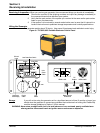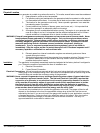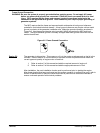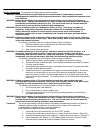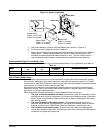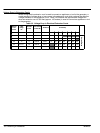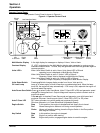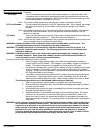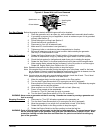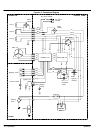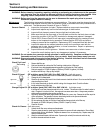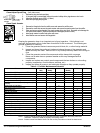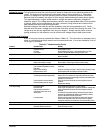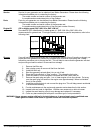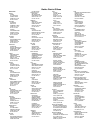
4-2 Operation MN2403
Operator Control Panel
Continued
~ AC Output Two AC receptacles are provided to allow easy connection of electrical loads. Both
receptacles may be used at the same time provided the total electrical load does not
exceed the generators rated output. GFCI (Ground Fault Circuit Interrupter) provides
ground fault protection for NEMA 5−20R only.
Note: The nominal voltage produced by the generator at each receptacle is 120VAC.
DC Circuit Breaker Provide overcurrent protection for the DC Output terminals. When tripped, the plunger
will extend from the body of the breaker. Simply push the plunger in to reset the
breaker.
Note: If the breaker continues to trip, disconnect all loads and reset the breaker. If the breaker
trips with all loads disconnected, turn off the generator and discontinue use until the
generator is repaired.
DC Output Two screw type terminals provide DC output used to charge automotive type batteries.
Red terminal post is positive (+). Black terminal post is negative (−).
Note: The DC and AC outlets of the generator can be used at the same time as long as the total
power consumed does not exceed the output rating.
WARNING: A battery presents a risk of electrical shock hazard and high short circuit current. The
following precautions are to be followed when working on batteries:
WARNING: The battery electrolyte is a dilute sulfuric acid that is harmful to the skin and eyes. It is
electrically conductive and corrosive. The following precautions are to be followed when
working on batteries:
WARNING: A battery presents a risk of fire because they generate hydrogen gas. Hydrogen gas is
extremely explosive. Never jump start a battery, smoke in the area around the battery or
cause any spark to occur in the area around the battery.
However several safety precautions must be followed:
S When charging a large capacity battery or a totally discharged battery, excessive
current may trip the DC breaker. If this happens, use a battery charger to charge the
battery. The battery charger can be plugged into the generators AC output.
S An explosive hydrogen gas is given off by the battery (through the batteries vent holes)
when it is charged. Do not allow a spark or open flame to be present during battery
charging. Always turn off the generator before disconnecting the battery leads from the
DC Output terminals to avoid a spark.
S The battery contains electrolyte solution which is caustic and can cause severe burns
and blindness. If electrolyte contacts skin or eyes, immediately flush the area with
water and seek medical attention quickly. Never charge a battery that is low on water.
The following precautions are to be followed when working on batteries:
1. Wear full eye protection (safety glasses or goggles) and protective clothing.
2. Where electrolyte contacts the skin, flush the area immediately with water and wash it
off using soap and water.
3. Where electrolyte contacts the eyes, immediately flush the eye thoroughly with water
and seek medical attention quickly.
4. Spilled electrolyte is to be washed down with an acid neutralizing agent. A common
practice is to use a solution of one pound (500 grams) bicarbonate of soda to one
gallon (four liters) of water. the bicarbonate solution is to be added until evidence of
reaction (foaming) has ceased. The resulting liquid is to be flushed with water and the
area dried.
WARNING: Never connect this generator to any buildings electrical system unless a licensed electrician
has installed an approved transfer switch. The National Electrical Code (NEC) requires that
connection of a generator to any electrical circuit normally powered by means of an electric
utility must be connected by means of approved transfer switch equipment so as to isolate
the electrical circuit from the utility distribution system when the generator is operating.
Failure to isolate the electrical circuits by such means may result in injury or death to utility
power workers due to backfeed of electrical energy onto the utility lines.




